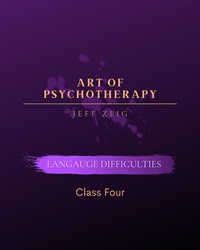
- Average Rating:
- Not yet rated
- Topic Areas:
- Clinical Demonstrations | Experiential Therapy | Psychotherapy | Therapist Development | Art and Creativity | Ericksonian Psychotherapy | Art of Psychotherapy
- Bundle:
- Art of Psychotherapy - Experiential Series
- Categories:
- Art of Psychotherapy
- Faculty:
- Jeffrey Zeig, PhD
- Course Levels:
- Master Degree or Higher in Health-Related Field
- Duration:
- 2 Hours 15 Minutes
- Format:
- Audio and Video
- Original Program Date:
- Jun 07, 2020
- Short Description:
- In our final class of this series, our demonstration subject has an impediment in learning the German language.
- Price:
- $79.00 - Base Price
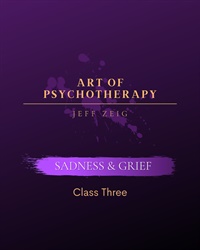
- Average Rating:
- Not yet rated
- Topic Areas:
- Clinical Demonstrations | Experiential Therapy | Grief | Psychotherapy | Therapist Development | Art and Creativity | Ericksonian Psychotherapy | Art of Psychotherapy
- Bundle:
- Art of Psychotherapy - Experiential Series
- Categories:
- Art of Psychotherapy
- Faculty:
- Jeffrey Zeig, PhD
- Course Levels:
- Master Degree or Higher in Health-Related Field
- Duration:
- 2 hours 22 minutes
- Format:
- Audio and Video
- Original Program Date:
- May 31, 2020
- Short Description:
- The presenting problem for Class 3 is an issue with expressing sadness and grief.
- Price:
- $79.00 - Base Price
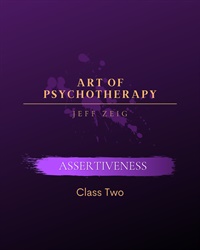
- Average Rating:
- Not yet rated
- Topic Areas:
- Clinical Demonstrations | Experiential Therapy | Psychotherapy | Therapist Development | Art and Creativity | Ericksonian Psychotherapy | Art of Psychotherapy
- Bundle:
- Art of Psychotherapy - Experiential Series
- Categories:
- Art of Psychotherapy
- Faculty:
- Jeffrey Zeig, PhD
- Course Levels:
- Master Degree or Higher in Health-Related Field
- Duration:
- 2 Hours 25 Minutes
- Format:
- Audio and Video
- Original Program Date:
- May 24, 2020
- Short Description:
- Our demonstration subject for Class 2 is a psychiatrist who would like to become a better leader.
- Price:
- $79.00 - Base Price
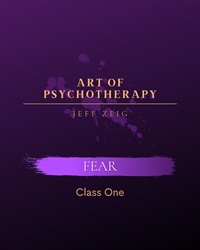
- Average Rating:
- Not yet rated
- Topic Areas:
- Experiential Therapy | Clinical Demonstrations | Phobia | Psychotherapy | Therapist Development | Art and Creativity | Ericksonian Psychotherapy | Art of Psychotherapy
- Bundle:
- Art of Psychotherapy - Experiential Series
- Categories:
- Art of Psychotherapy
- Faculty:
- Jeffrey Zeig, PhD
- Course Levels:
- Master Degree or Higher in Health-Related Field
- Duration:
- 2 Hours 5 Minutes
- Format:
- Audio and Video
- Original Program Date:
- May 17, 2020
- Short Description:
- The presenting problem for Class 1 is fear.
- Price:
- $79.00 - Base Price
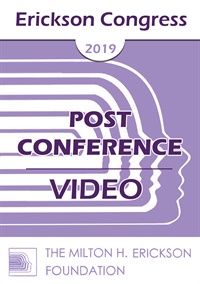
- Average Rating:
- Not yet rated
- Topic Areas:
- Master Classes | Ericksonian Psychotherapy | Psychotherapy | Brief Therapy | Hypnotherapy | Self-Relations | Utilization
- Categories:
- Erickson Congress | Erickson Congress 2019
- Faculty:
- Bill O'Hanlon, MS | Jeffrey Zeig, PhD
- Course Levels:
- Master Degree or Higher in Health-Related Field
- Duration:
- 4 Hours 49 Minutes
- Format:
- Audio and Video
- Original Program Date:
- Dec 16, 2019
- Short Description:
- Ericksonian hypnotherapy and the Self-Relations approach are experiential methods of change. In combination they can be synergistic. Psychotherapy is best when clients have a first-hand experience of an alive therapeutic process. Such dynamic empowering experiences pave the way for dynamic understandings. Bill O’Hanlon and Jeffrey Zeig will engage with each other and the participants to examine commonalities and differences in their work.
- Price:
- $59.00 - Base Price
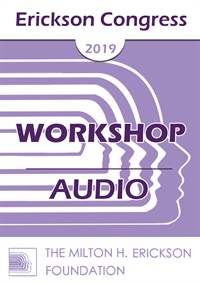
- Average Rating:
- Not yet rated
- Topic Areas:
- Workshops | Grief | Ericksonian Hypnosis and Therapy Techniques | Ericksonian Psychotherapy | Hypnosis | Psychotherapy | Aging and Mortality
- Categories:
- Erickson Congress | Erickson Congress 2019
- Faculty:
- Teresa Garcia-Sanchez, MA
- Duration:
- 1 hour 46 minutes
- Format:
- Audio Only
- Original Program Date:
- Dec 15, 2019
- Short Description:
- Loved ones leave us, couples and friends separate, we suffer physical changes as we grow up during adolescence and as we grow old, work changes happen, as well as our mood, which evolves throughout our lives.
- Price:
- $15.00 - Base Price
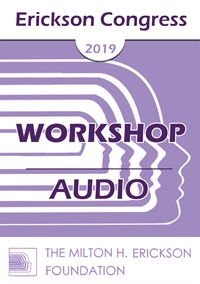
- Average Rating:
- Not yet rated
- Topic Areas:
- Workshops | Ericksonian Psychotherapy | Psychotherapy | Ericksonian Hypnosis and Therapy Techniques | Unconscious Processes
- Categories:
- Erickson Congress | Erickson Congress 2019
- Faculty:
- Teresa Robles, MA, PhD
- Duration:
- 1 Hour 30 Minutes
- Format:
- Audio Only
- Original Program Date:
- Dec 15, 2019
- Short Description:
- Dr. Erickson proposed that all our life experiences were learnings and resources registered in our Unconscious Mind. He considered Unconscious Mind as a Wise Part. For Quantum Physics in the same way that all the information about each person is in its DNA, the information of the Whole Universe is present in each one of its parts. I call that information our Universal Wisdom. Wisdom, because it is all the information and Universal because it is the same everywhere. For me Universal Wisdom is the Creative Force, and so, Almighty. That is not a question of beliefs but a question of imagining. What we imagine for our brain is stronger than what it recognizes as reality.
- Price:
- $15.00 - Base Price
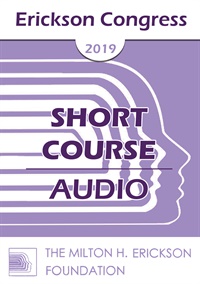
- Average Rating:
- Not yet rated
- Topic Areas:
- Short Courses | Children and Adolescent Therapy | Ericksonian Psychotherapy | Psychotherapy | Ericksonian Hypnosis and Therapy Techniques | Family Therapy
- Categories:
- Erickson Congress | Erickson Congress 2019
- Faculty:
- Maria Escalante de Smith, MA
- Duration:
- 1 Hour
- Format:
- Audio Only
- Original Program Date:
- Dec 12, 2019
- Short Description:
- Ericksonian Psychotherapy emphasizes the importance of utilization. When treating children, as therapists, we need to keep in mind that we also need to utilize whatever happens during therapy whether that can be a given behavior, if the child brings a toy for the consultation, their likes and also provide them with a wide array of resources they can access during therapy.
- Price:
- $15.00 - Base Price
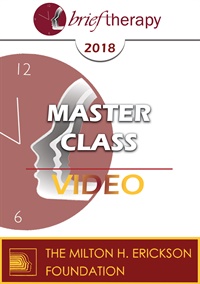
- Average Rating:
- Not yet rated
- Topic Areas:
- Master Classes | Hypnosis | Psychotherapy | Ericksonian Hypnosis and Therapy Techniques | Strategic Therapy | Ericksonian Psychotherapy | Experiential Therapy | Hypnotherapy
- Categories:
- Brief Therapy Conference | Brief Therapy Conference 2018
- Faculty:
- Michael Yapko, PhD | Jeffrey Zeig, PhD
- Course Levels:
- Master Degree or Higher in Health-Related Field
- Duration:
- 2:56:13
- Format:
- Audio and Video
- Original Program Date:
- Dec 10, 2018
- Short Description:
- Ericksonian hypnotherapy and strategic approaches promote experiential methods of change. In combination they can be synergistic. Psychotherapy is best when clients have the experience of an alive, goal-oriented therapeutic process. Such dynamic empowering experiences pave the way for new understandings and growth-oriented possibilities. Drs. Yapko and Zeig will engage with each other and the participants to examine commonalities and differences in their work. The Master Class centers on providing then deconstructing demonstrations of Ericksonian Psychotherapy and Hypnosis, providing a unique opportunity for in-depth learning.
- Price:
-
Sale is $29.00
price reduced from Base Price - $59.00
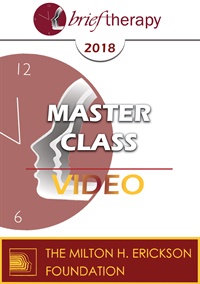
- Average Rating:
- Not yet rated
- Topic Areas:
- Master Classes | Hypnosis | Psychotherapy | Ericksonian Hypnosis and Therapy Techniques | Ericksonian Psychotherapy | Experiential Therapy | Hypnotherapy
- Categories:
- Brief Therapy Conference | Brief Therapy Conference 2018
- Faculty:
- Michael Yapko, PhD | Jeffrey Zeig, PhD
- Course Levels:
- Master Degree or Higher in Health-Related Field
- Duration:
- 2:43:33
- Format:
- Audio and Video
- Original Program Date:
- Dec 10, 2018
- Short Description:
- Ericksonian hypnotherapy and strategic approaches promote experiential methods of change. In combination they can be synergistic. Psychotherapy is best when clients have the experience of an alive, goal-oriented therapeutic process. Such dynamic empowering experiences pave the way for new understandings and growth-oriented possibilities. Drs. Yapko and Zeig will engage with each other and the participants to examine commonalities and differences in their work. The Master Class centers on providing then deconstructing demonstrations of Ericksonian Psychotherapy and Hypnosis, providing a unique opportunity for in-depth learning.
- Price:
-
Sale is $29.00
price reduced from Base Price - $59.00
Please wait ...

